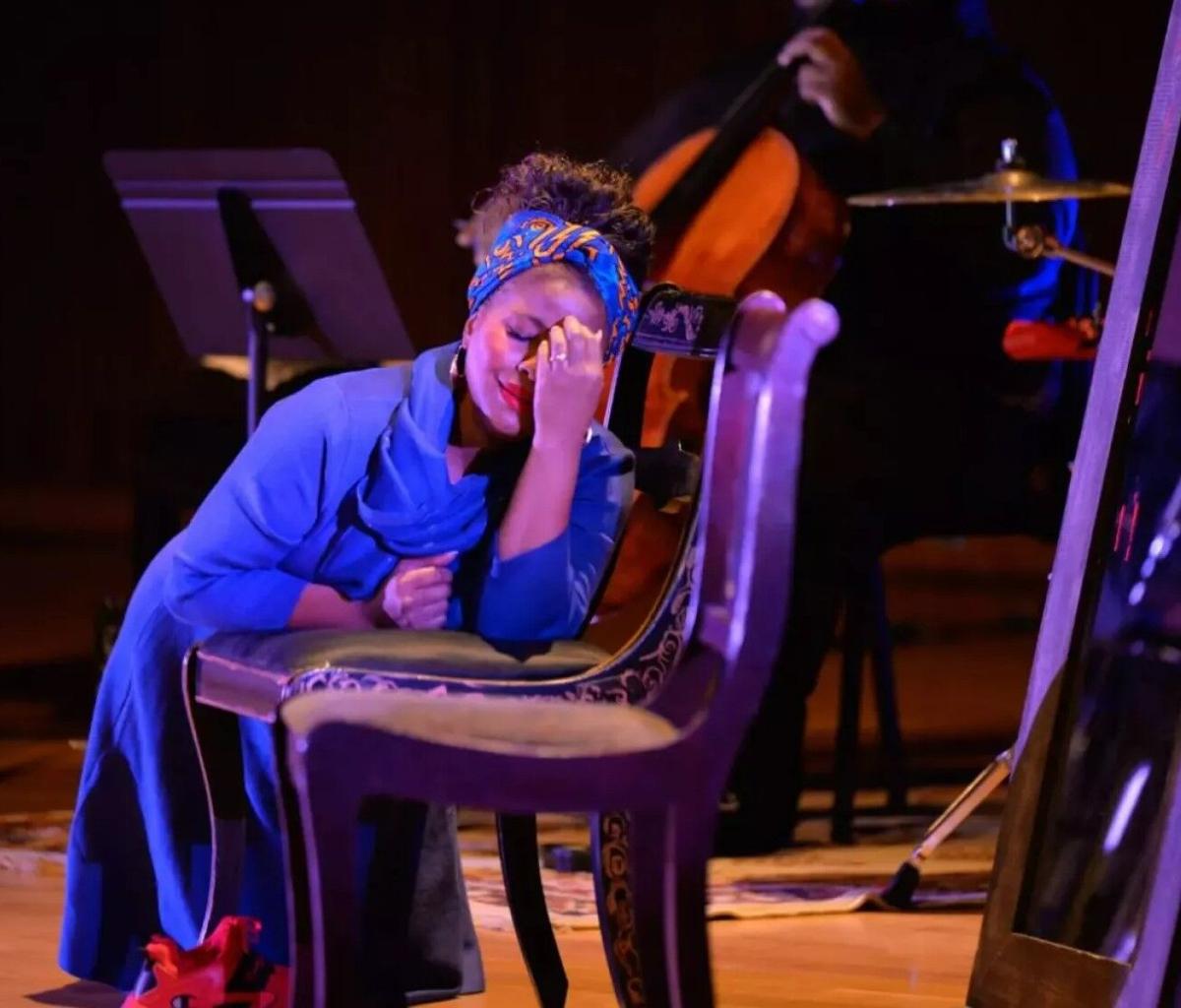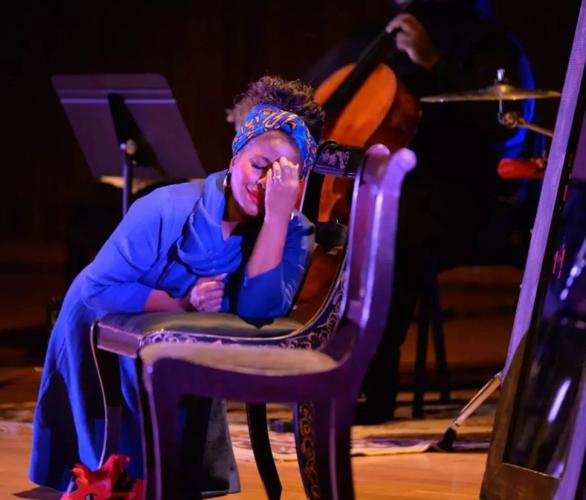Union Avenue Opera successfully rescued its mainstage season after MayŌĆÖs EF-3 tornado blasted its venue. Now, it inaugurates a fall festival that pairs two chamber operas on socially important topics.
Susan Kander and Roberta GumbelŌĆÖs ŌĆ£dwb [driving while black]ŌĆØ concerns a Black motherŌĆÖs anxieties as her son nears driving age. ŌĆ£As One,ŌĆØ by Laura Kaminsky, Mark Campbell and Kimberly Reed, dramatizes a transgender womanŌĆÖs coming of age.
Receiving its 10th production since its 2018 premiere, ŌĆ£dwbŌĆØ rosters a cellist, a percussionist and a soprano, the Mother, who works through complex feelings involving ŌĆ£the talkŌĆØ that African American parents have with their kids about handling police stops. Gumbel, the librettist, first sang the role.
People are also reading…
Originally conceived as a song cycle, ŌĆ£dwbŌĆØ developed into an opera. ŌĆ£ItŌĆÖs autobiographical, but itŌĆÖs very heightened from my actual life experience. I started writing, and the next thing I know, it was no longer a 15-minute song cycle, it was a 45-minute dramatic piece.ŌĆØ Her own son was 15 then.
ŌĆ£Every story we tell in ŌĆśdwbŌĆÖ happened, whether itŌĆÖs the headlines that the mother is reading, or the stories that sheŌĆÖs hearing. There are some that happened to my nephew, some that happened to my brothers, one that happened to my husband, and then some are pulled directly from the headlines, which when you see it, youŌĆÖll recognize, IŌĆÖm sure. So, all of itŌĆÖs true. Heightened for the stage, yes, but absolutely true.ŌĆØ
UAO favorite, soprano Marsha Thompson, plays the Mother in ŌĆ£dwb.ŌĆØ
ŌĆ£One of the lines is ŌĆświth this privilege (driving) comes independence, but also terror,ŌĆÖ because itŌĆÖs her fear that one night she may receive a knock on her door as other mothers have received,ŌĆØ Thompson says.
Performances of ŌĆ£dwbŌĆØ have coincided with national news of police brutality.
ŌĆ£When this was performed in Birmingham two and a half years ago, Allison Sanders was singing it,ŌĆØ Thompson says, ŌĆ£and the performance was the same night they released the police video of Tyre Nichols being beaten to death (by police in Memphis).ŌĆØ
Though the opera addresses a greater risk for African Americans, Thompson also notes, ŌĆ£This has happened to southeast Asian Americans, it has happened to, obviously, Latinos, and it can happen to anybody. There have been white Americans pulled over whoŌĆÖve also been abused. So itŌĆÖs not just a Black experience. This is an American experience.ŌĆØ
The emotionally harrowing drama is reinforced by composer Susan KanderŌĆÖs score, who speaks of musicŌĆÖs capacity to affect people. ŌĆ£We are having in both of these operas a very intense, very intimate, theatrical, dramatic experience and music is put to use to heighten all of that and make it more immediate and make it more intimate and make it a much more instantaneous nervous system response on the part of the audience.ŌĆØ
Of her chamber scaling, Kander says: ŌĆ£We calmed it down to this place where I think audiences can hear just about every note. And yet it sounds fully orchestral.ŌĆØ
ŌĆ£dwbŌĆØ has traveled, but ŌĆ£As OneŌĆØ has gone downright viral; UAOŌĆÖs staging will be its 65th since its 2014 premiere. Composer Laura Kaminsky employs only slightly more instrumental forces than Kander ŌĆö a string quartet.

Taylor Raven as Hanna After and Jorell Williams as Hannah Before in ŌĆ£As One,ŌĆØ at Seattle Opera
Kaminsky, best known for composing instrumental chamber music, explains the orchestration: ŌĆ£So the piece is really a dialogue of a person with themselves, Hannah Before and Hannah After, or older and younger characters. And when I started to realize that, I wanted to have an intimate chamber setting for it, and it seemed most useful to have a string quartet because itŌĆÖs really one sound. Just as the two voices play one character, the quartet is one voice from the lowest note of the cello to the highest harmonic on a violin and kind of a seamlessness around it.
ŌĆ£I wanted to make this piece feel very intimate and contained. ThatŌĆÖs what it needed to be.ŌĆØ
Two singers play the protagonist, baritone Evan Bravos as Hannah Before, and mezzo-soprano Emma Sorenson as Hannah After.
Bravos, however, deemphasizes the idea of gender ŌĆ£transition,ŌĆØ noting that HannahŌĆÖs still the same person.
ŌĆ£In the score it says ŌĆśHannah BeforeŌĆÖ and ŌĆśHannah After,ŌĆÖ but I think theyŌĆÖve started saying ŌĆśHannah YoungerŌĆÖ and ŌĆśHannah Older,ŌĆÖ just to erase the notion that theyŌĆÖre two different people and to say, yes, Hannah Before exists within Hannah After. Her (knowledge) has grown, her personhood has grown, her depth. Because at one point she did occupy one gender and now she occupies the other. And I think thatŌĆÖs important, too.ŌĆØ
Mark Campbell might be the most prolific opera librettist working today. But handling the subject matter for ŌĆ£As OneŌĆØ took extra care.
ŌĆ£It was my decision to engage Kimberly Reed as co-librettist. She had never written an opera before, but she is trans, and thereŌĆÖs no way that I could have had any kind of authenticity in my voice as the librettist for this work if I had not asked her to co-write the libretto with me. So I had a very powerful ally with her. And it happens that sheŌĆÖs also a tremendous writer and a great storyteller.ŌĆØ (Reed, a film director currently on a shoot, could not be reached for comment).
Opera, fundamentally, is storytelling. Kander agrees: ŌĆ£It makes those stories hit your nervous system faster and harder, I think, than they would if either one of them were just delivered as plays. What I come back to all the time in my own work ŌĆö human beings like to gather together in a dark space and tell stories.ŌĆØ













